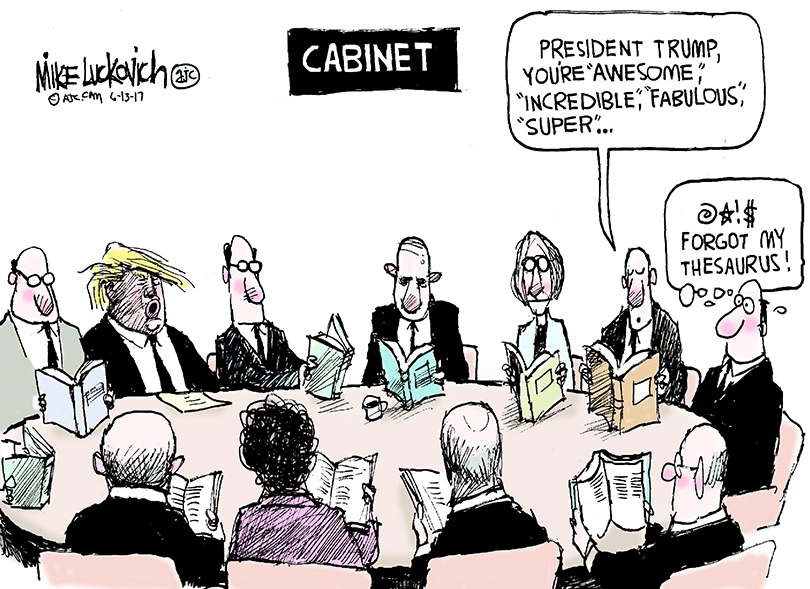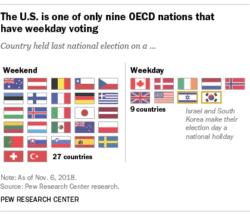‘No Way To Prevent This,’ Says Only Nation Where This Regularly Happens
Here’s why:
 Like Digby, I found a lot to like in Paul Krugman’s recent column on how the Trump wing of the GOP (can you call it a ‘wing’ if it’s more than 3/4 of the whole?) has for several years increasingly resembled a cult of personality as exhibited in dictatorial regimes.
Like Digby, I found a lot to like in Paul Krugman’s recent column on how the Trump wing of the GOP (can you call it a ‘wing’ if it’s more than 3/4 of the whole?) has for several years increasingly resembled a cult of personality as exhibited in dictatorial regimes.
Signaling is a concept originally drawn from economics; it says that people sometimes engage in costly, seemingly pointless behavior as a way to prove that they have attributes others value. For example, new hires at investment banks may work insanely long hours, not because the extra hours are actually productive, but to demonstrate their commitment to feeding the money machine.
In the context of dictatorial regimes, signaling typically involves making absurd claims on behalf of the Leader and his agenda, often including “nauseating displays of loyalty.” If the claims are obvious nonsense and destructive in their effects, if making those claims humiliates the person who makes them, these are features, not bugs. I mean, how does the Leader know if you’re truly loyal unless you’re willing to demonstrate your loyalty by inflicting harm both on others and on your own reputation?
And once this kind of signaling becomes the norm, those trying to prove their loyalty have to go to ever greater extremes to differentiate themselves from the pack. Hence “flattery inflation”
Krugman points to Xavier Márquez’s paper, The Mechanisms of Cult Production as the go-to reading here, but anyone who remembers Trump’s creepy cabinet meetings 1 will find the current reality distortion field in Mar-a-Lago to be just more of the same.
 ]
] I’m fine with making Juneteenth a federal holiday, I just hope it won’t become an excuse for not making Election Day a federal holiday. I can just imagine the arguments: We just made another holiday, that’s enough for new holidays for the nexty 20 years, they cost too much money, etc. etc.
I’m fine with making Juneteenth a federal holiday, I just hope it won’t become an excuse for not making Election Day a federal holiday. I can just imagine the arguments: We just made another holiday, that’s enough for new holidays for the nexty 20 years, they cost too much money, etc. etc.
And I think making it easier for people to vote is forward-looking in an important way; yes, the right commemoration can be both forward- and backward-looking, but I still think an election day holiday is more important.
 I’m really busy, so this is just a tease, and device to force me to write more later.
I’m really busy, so this is just a tease, and device to force me to write more later.
1730s-1740s
1790s-1840s/50s
1850s-1900s
c. 1966-c. 1974
Most people probably don’t know what those dates signify. In a future post or posts I will have two things to say about them. One is utterly unoriginal, but quite important, and concerns the gap between the first line and the second. The second is utterly speculative, and concerns a fifth line in the sequence above.
Back to work.
 I’ve just discovered The Vetting Room, which looks like a very useful blog offering short descriptions of the qualifications of, and potential controversies about, nominees to the federal judiciary.
I’ve just discovered The Vetting Room, which looks like a very useful blog offering short descriptions of the qualifications of, and potential controversies about, nominees to the federal judiciary.
Or, as they put it,
The Vetting Room is a legal blog dedicated to discussing, examining, and analyzing judicial nominations. Specifically, we research the records of President Trump’s judicial nominees, condense the important issues, and present it for public use. All of our investigations are conducted by volunteer attorneys who are committed to an independent and thorough review. Our posts are the product of multiple rounds of research and editing, and sometimes include the contributions of multiple attorneys.
The Vetting Room is not formally affiliated with any partisan or nonpartisan groups, and maintains the primary goal of improving public engagement with the federal judicial confirmation process.

These are probably stupid questions, but I never took Labor Law: Why is it that the U.S. government can require some workers (e.g. TSA) to do their jobs without pay? As a formal legal matter there is no way that the bosses can guarantee back pay will be forthcoming ever, since it’s axiomatic that money can only be disbursed from the Treasury pursuant to a Congressional appropriation. Theoretically, Congress might never vote the back pay.
Doesn’t the absence of a payment guarantee make the forced labor either involuntary servitude, or at least a wage-and-hours violation since it is work for less than the minimum wage (zero)?
I presume the answer to the 13th Amendment question might have something to do with terms in the employment contract, in that the government perhaps reserves the right to require the unpaid labor, or the worker gets fired. Or, more likely, it’s just that civilian workers (but not military personnel, in this case the Coast Guard?) have the choice to just not show up and be fired, as opposed to slavery/involuntary servitude when the worker has no option to quit. That option, I’m guessing, makes the servitude not ‘involuntary’ for 13th Amendment purposes?
But even so, how does this conform with minimum wage laws? Is it as simple as, no one brings the case, then backpay makes the matter moot? In which case, how long before someone files the complaint?